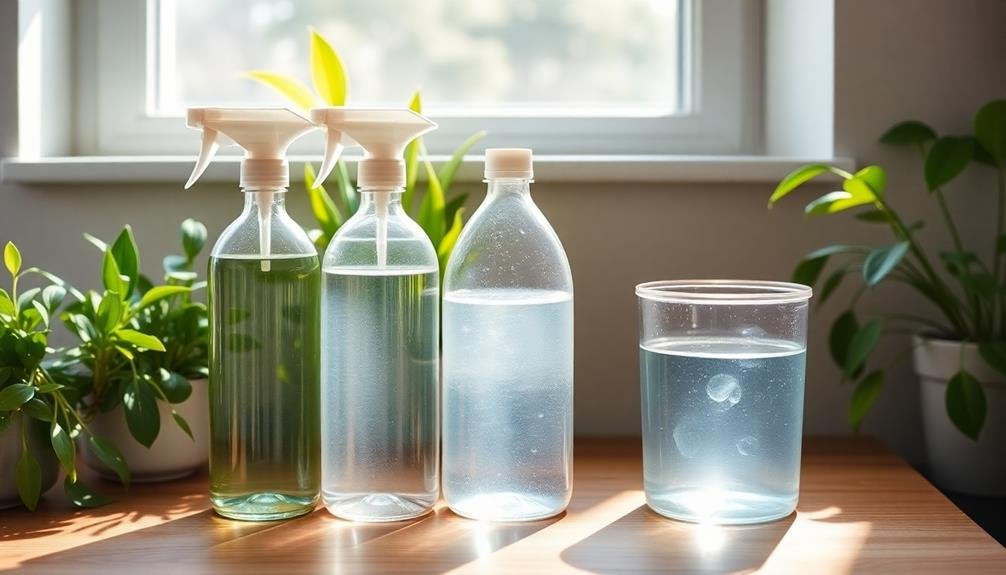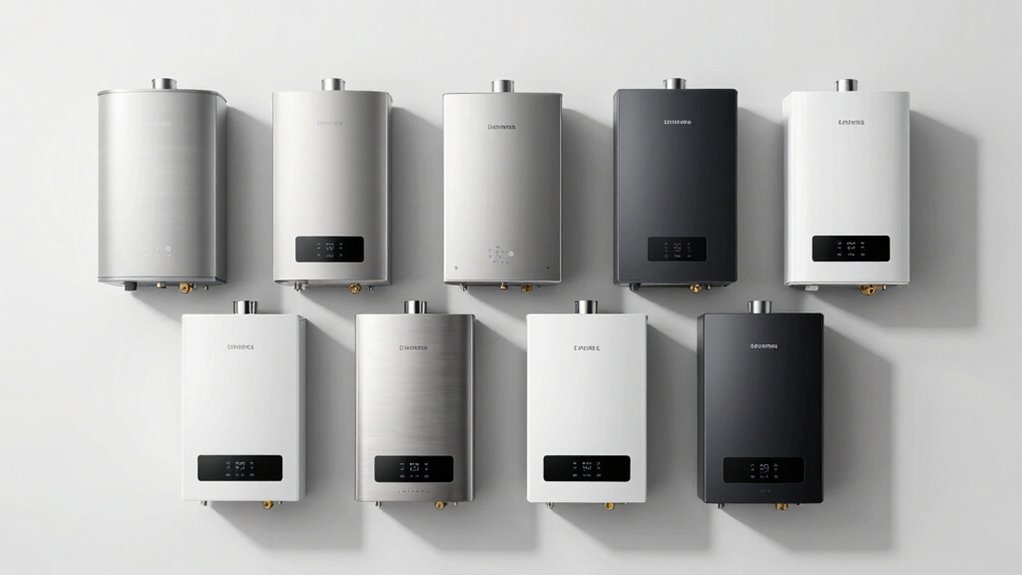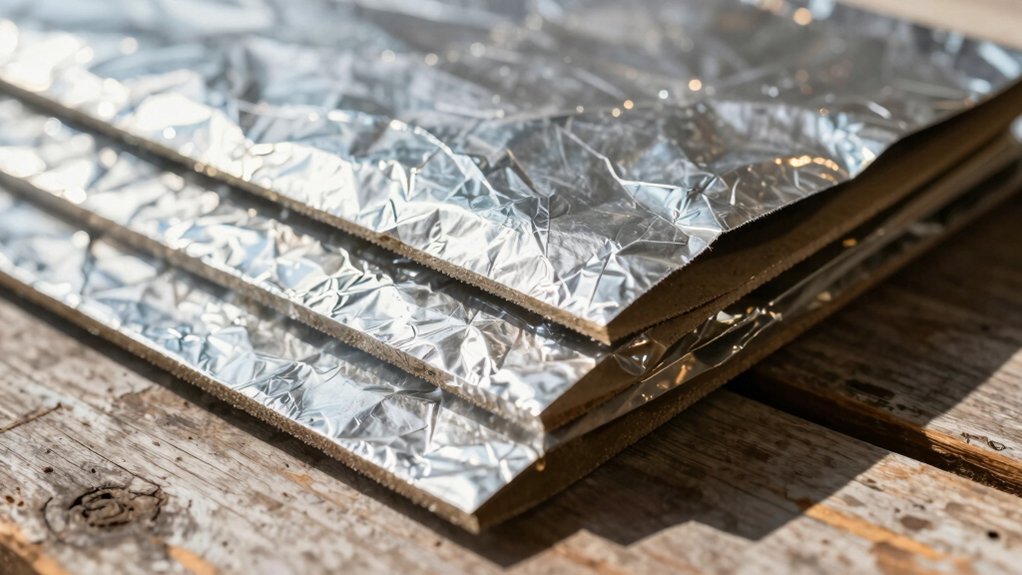For your greywater system, consider these top eco-friendly cleaners: biodegradable laundry detergents, natural all-purpose cleaners, and enzyme-based drain treatments. Opt for plant-based laundry detergents like Seventh Generation or Ecover, which break down quickly in the environment. For general cleaning, use vinegar, baking soda, or lemon juice mixed with water – they're effective and safe for greywater recycling. To maintain clear pipes, choose enzyme-based drain treatments that naturally break down organic matter without harsh chemicals. These options not only keep your greywater system running smoothly but also protect the environment. Exploring each cleaner type will reveal more benefits for your sustainable household.
Biodegradable Laundry Detergents

In light of the growing popularity of greywater systems, biodegradable laundry detergents have become essential. These eco-friendly cleaners break down quickly in the environment, making them ideal for reusing water from your washing machine.
When choosing a biodegradable detergent, look for plant-based ingredients and avoid harsh chemicals like phosphates, chlorine, and artificial fragrances.
You'll find several excellent options on the market. Brands like Seventh Generation and Ecover offer concentrated liquid detergents that are both effective and environmentally friendly.
If you prefer powder detergents, consider Bio-D or Ecozone, which come in recyclable packaging. For those who enjoy the convenience of pods, Dropps offers plastic-free, biodegradable options.
When using these detergents, you'll need to adjust your habits slightly. They're often more concentrated than traditional detergents, so you'll use less per load.
You may also need to pre-treat tough stains, as these gentler formulas can be less aggressive. However, the trade-off is worth it: your clothes will be clean, and you'll be contributing to a healthier ecosystem.
Natural All-Purpose Cleaners
Next on our eco-friendly cleaning journey, let's explore natural all-purpose cleaners for greywater systems. These versatile cleaners are essential for maintaining a clean home while protecting your greywater system and the environment.
You'll find that vinegar is a powerhouse natural cleaner. Mix equal parts white vinegar and water in a spray bottle for an effective all-purpose solution. It's great for cleaning countertops, sinks, and bathroom surfaces. The acidity of vinegar helps break down grime and kill bacteria without harming your greywater system.
Baking soda is another excellent option. Create a paste by mixing it with a small amount of water. This abrasive yet gentle cleaner works wonders on stubborn stains and soap scum. It's safe for most surfaces and won't introduce harmful chemicals into your greywater.
For a pleasant-smelling cleaner, try mixing lemon juice with water. The citric acid in lemons acts as a natural disinfectant and deodorizer. It's particularly effective for cleaning glass and leaving a fresh scent.
Enzyme-Based Drain Treatments

Enzyme-based drain treatments offer an eco-friendly solution for maintaining clear pipes in greywater systems. These treatments use natural enzymes to break down organic matter, preventing clogs and ensuring smooth water flow. Unlike harsh chemical cleaners, enzyme-based products won't harm your greywater system or the environment.
When choosing an enzyme-based drain treatment, look for products specifically designed for greywater systems. These formulations typically contain a blend of bacteria and enzymes that target common household waste. They're safe for all types of pipes and septic systems, making them ideal for greywater recycling.
To use enzyme-based drain treatments effectively, you'll need to apply them regularly. Here's a quick guide to help you get started:
| Frequency | Application Method | Benefits |
|---|---|---|
| Weekly | Pour directly into drain | Prevents buildup |
| Monthly | Let sit overnight | Deep cleans pipes |
| Quarterly | Use with hot water flush | Removes stubborn clogs |
Frequently Asked Questions
How Often Should I Clean My Greywater System?
You should clean your greywater system every 3-6 months, depending on usage. Regular maintenance prevents clogs and guarantees efficient operation. Check filters monthly, remove debris, and flush pipes occasionally. Don't forget to inspect for leaks and odors.
Can I Use Vinegar in My Greywater System?
You can use vinegar in your greywater system. It's a safe, eco-friendly cleaner that won't harm plants or soil. However, don't overuse it. Use diluted vinegar sparingly for cleaning and maintenance to avoid altering soil pH levels.
Are Essential Oils Safe for Greywater Systems?
You should be cautious with essential oils in greywater systems. While they're natural, they can be harmful to plants and soil in high concentrations. It's best to use them sparingly or opt for greywater-safe alternatives instead.
What Plants Benefit Most From Greywater Irrigation?
You'll find that drought-tolerant plants thrive with greywater irrigation. Fruit trees, ornamental shrubs, and native species benefit greatly. Avoid using greywater on root vegetables or plants you'll eat raw. Always consider your local regulations when irrigating.
How Can I Reduce Soap Scum Buildup in My Greywater Pipes?
You can reduce soap scum buildup by using biodegradable soaps, installing filters, and regularly flushing your pipes with hot water. It's also helpful to minimize grease and oil in your wastewater and clean your drains monthly with vinegar and baking soda.
In Summary
You've now got the scoop on eco-friendly cleaners for your greywater system. By choosing biodegradable laundry detergents, natural all-purpose cleaners, and enzyme-based drain treatments, you're protecting your system and the environment. Remember, what goes down your drain affects your greywater's usability. Make these smart choices, and you'll keep your system running smoothly while reducing your ecological footprint. It's a win-win for you and the planet!





Leave a Reply